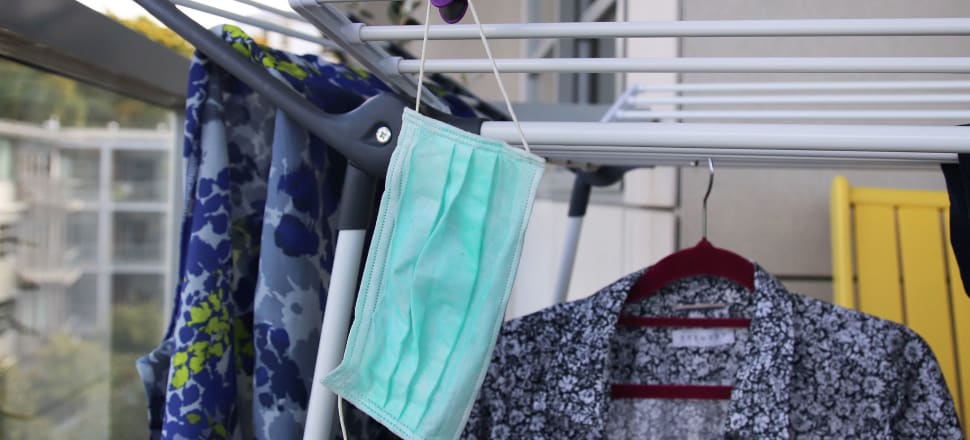
With Omicron set to spread throughout New Zealand, masks are becoming (even) more of a health essential – but finding the right mask is not just about filtering, but also fit and fraud, as Sam Sachdeva reports
Throughout the Covid-19 pandemic in New Zealand, face masks have sometimes felt closer to a fashion accessory than a medical device, with relatively limited community transmission and loose government guidelines allowing for a wide variety of face coverings to be worn when required.
But with Omicron's arrival into the community, Prime Minister Jacinda Ardern on Tuesday announced all Kiwis would be required to wear a mask specifically designed to cover the nose and mouth, with workers under a vaccine mandate needing to wear a medical-grade mask.
"We’ve looked at a lot of overseas data on who is most successfully managing Omicron – masks play a significant role when done right," Ardern said.
However, Director-General of Health Dr Ashley Bloomfield said health officials were not recommending the use of higher-specification N95 masks for the wider public, due in part to their cost and limited supply.
Dr Joel Rindelaub, a research fellow at the University of Auckland who specialises in aerosol chemistry, told Newsroom the Government should be encouraging the uptake of N95 or equivalent masks as they offered the best protection available.
“Of course there are going to be some increased costs associated with them so there are going to be equity issues,” Rindelaub said, meaning the state would need to play a role in distributing the masks to those who could not afford to buy their own.
“The material that surgical masks are made out of is actually pretty good so far as filtering goes – it’s just that it doesn’t fit tightly around the face, which is obviously an issue.” – Dr Joel Rindelaub
Alternatives for those who could not currently access high-standard masks included the “knot and tuck method” for surgical masks to ensure a tighter fit, or wearing a tight-fitting cloth mask over the top of a surgical mask for a similar effect.
“The material that surgical masks are made out of is actually pretty good so far as filtering goes – it’s just that it doesn’t fit tightly around the face, which is obviously an issue.”
Rindelaub said the fit of a mask was a key consideration, but while in an ideal world every mask would be fit-tested before use, logistics meant it was more practical to focus on those frontline workers who were most likely to be exposed to Covid-19.
While much of the focus in New Zealand and abroad has been on N95 products, that is just one of a number of international standards on offer.
The P2 respiratory filter was developed under standards for Australia and New Zealand and has a broadly similar performance to N95 products, while there is also the KF94 standard from South Korea and the KN95 standard from China.
However, in addition to fit there is also the issue of fraud.
The US Center for Disease Control and Prevention has estimated that roughly 60 percent of the KN95 masks it evaluated during 2020 and 2021 did not meet the requirements expected of them, with some Chinese manufacturers telling the agency it has not produced the masks being sold under their name.
In a May 2020 presentation, the New Zealand Occupational Hygiene Society noted the similarity between the Conformité Européenne mark, which shows a face mask has met the safety and compliance requirements to be sold within the European Union, and the China Export logo, which shows only that a product has been produced in China.

Rindelaub said his preference was for N95 or P2 masks given the risk of counterfeit KN95 products, with the KF94 also a useful alternative.
“If you’re buying from maybe some unscrupulous online sellers, it’s best to exercise caution.”
Consumer NZ spokeswoman Gemma Rasmussen told Newsroom the organisation had noticed a spike in enquiries from people looking for advice about masks following Omicron’s arrival in the community.
Given limited supplies of high-standard masks within the country, Rasmussen said people needed to scrutinise sellers carefully before buying them online, with telltale concerns including a lack of contact information or details about where the mask was manufactured.
Another concern was a shortage of masks leading to price gouging, with people already making complaints about increases “to a point that’s just not reasonable”.
“It's really difficult because when you're talking about a matter of health, sometimes people are just going to prioritise and pay the price, and technically there is no law against putting up prices when demand is increased – but there is an ethical issue for a business, and they do need to have a justification for the increase in price.”
Consumers could make a complaint to the Commerce Commission about misleading and deceptive conduct or false representation, while the Ministry of Business, Innovation and Employment also had an online form to report potential price gouging.
Mask confiscations
Customs investigations manager Cam Moore told Newsroom the agency had made five seizures of face masks since March 2020, or nearly 3200 masks in total, for bearing false trade descriptions and not meeting the standards they claimed.
“When Customs suspects a commercial shipment of imported face masks bear a false trade description, we identify the manufacturer and compare the suspect product against the genuine article.”
Moore said Customs also worked closely with the Ministry of Health and other government agencies “to identify and expedite legitimate imports by approved suppliers for the Covid-19 response”.
Any New Zealanders planning to buy masks or other PPE items online should be aware of opportunists overseas who could be selling substandard products, he said.








